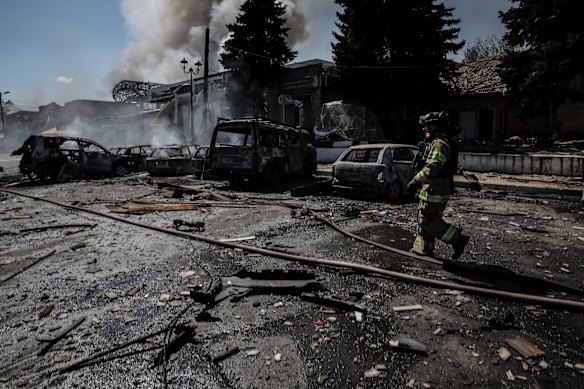
Russian forces have made significant advances in eastern Ukraine, seizing territory around the city of Dobropillya. This rapid military movement comes just ahead of planned discussions on a potential ceasefire between Russian President Vladimir Putin and US President Donald Trump on March 10, 2024. As tensions escalate, Putin has indicated that territory will be a central issue in negotiations.
The recent gains by Russian troops include increased control over a major highway leading west, posing a serious threat to Ukrainian defenses after a prolonged stalemate. The conflict has intensified as Russia has launched a series of missile and drone attacks on Ukrainian cities, particularly focusing on the Donetsk and Luhansk regions. This escalation raises concerns among European leaders about the potential implications for regional stability.
Ukrainian President Volodymyr Zelensky, who has not been invited to the Alaska summit, firmly stated that he will not agree to any territorial concessions regarding the Donbas region, which encompasses both Donetsk and Luhansk. In a recent statement, he expressed his concerns regarding the ongoing military actions: “We see that the Russian army is not preparing to end the war. On the contrary, they are making movements that indicate preparations for new offensive operations. In such circumstances, it is important that the unity of the world is not threatened.”
Implications of the Upcoming Talks
The planned meeting between Trump and Putin has drawn attention due to the precarious situation on the ground. Trump’s recent comments suggesting a possible “land-swapping” deal have raised alarms among European leaders, who have cautioned against any negotiations that might involve ceding territory. The European Union has expressed strong opposition to any proposals that would undermine Ukraine’s territorial integrity.
As the situation unfolds, the potential for a ceasefire remains uncertain. Reports indicate that Putin’s recent military maneuvers are part of a broader strategy to strengthen Russia’s negotiating position. The ongoing bombardment of Ukrainian cities and attempts to breach defenses highlight the urgency for diplomatic resolutions.
Zelensky’s government is facing mounting pressure to respond effectively to these developments, as the humanitarian impact of the conflict continues to escalate. The Ukrainian leadership is keen to maintain international support while navigating the complexities of high-stakes negotiations.
The outcome of the talks on March 10 could have profound implications not only for Ukraine but also for the geopolitical landscape of Europe. As both leaders prepare for discussions, the world watches closely, aware that the fate of millions hangs in the balance.







